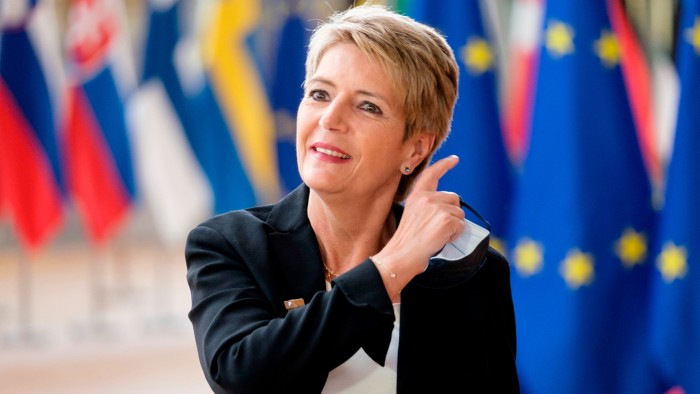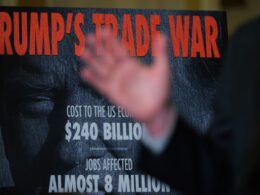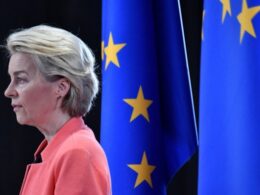Unlock the Editor’s Digest for free
Roula Khalaf, Editor of the FT, selects her favourite stories in this weekly newsletter.
US President Donald Trump’s tariff war has reignited a long-standing debate in Switzerland: whether it should inch closer to the EU, its largest trading partner.
Swiss president Karin Keller-Sutter will on Friday join EU finance ministers meeting in Warsaw, the first time the Alpine nation has done so. Keller-Sutter told local press this week the country wanted to “stabilise, deepen relations with the EU”.
The British chancellor, Rachel Reeves, is also set to attend and call on the UK and EU to work closely together on defence financing to provide greater economic and national security.
Export-oriented Switzerland was shocked to find itself among the countries facing the highest “reciprocal tariffs” announced by President Donald Trump this month — 31 per cent, nearly as much as China at 34 per cent.
Switzerland’s rate compared with 20 per cent for the neighbouring EU and 10 per cent for the UK, even though the country had abolished industrial tariffs last year. While the US has since paused the application of the levy for 90 days to allow for trade talks, Trump’s move sent chills down a country with a large US clientele eager for its luxury watches, fine chocolate and cheeses.
Trump’s trade broadside was seen as an unwinding of the American guarantees that have long underpinned Switzerland’s security, pushing the neutral country closer towards its Nato neighbours.
After the US announcement the Swiss president said she was in close contact with EU Commission president Ursula von der Leyen. Switzerland chose not to retaliate and Keller-Sutter had a phone call with Trump on Wednesday just hours before he reversed course and paused the tariffs.
Keller-Sutter’s visit to Warsaw comes after Switzerland and the EU signed a historic agreement late last year, pledging to overhaul their joint trading relationship after 10 years of difficult negotiations.
The details of the package, which covers a broad array of policies from freedom of movement to dispute settlement and food safety, are expected in June. It will have to be put to the Swiss public in a referendum before coming into force.
“If the vote on the EU-Switzerland Economic Framework was held tomorrow I am not sure it would succeed,” said one Swiss official in Zurich. “But now there is a window where pro-EU voices might have more sway than they would otherwise have.”
Cédric Wermuth, an MP and co-leader of the Swiss Social Democratic party, said the country can “no longer be an island within Europe.”
“There is a new reality sinking in and we can no longer profit in the way we did since the second world war,” he said, adding that there was “no alternative” than to pursue a “reorientation towards Europe”.
Thierry Paul Burkart, a liberal lawmaker in Switzerland’s upper house, said it was ever more important not to damage the country’s long and stable relationship with the EU “at a time when the world is so uncertain”.
The Eurosceptic opposition led by the Swiss People’s party (SVP) is fiercely against rekindling ties with the EU and has called the most recent agreement an “EU submission treaty”. Kompass Europa, an initiative launched by the founders of private equity firm Partners Group, has also lobbied fiercely against the treaty and what it describes as “passive EU membership”.
But François Savary, founder of Geneva-based Genvil Wealth Management and Consulting, said that the Trump administration and its tariffs “have changed the situation”.
“You are no longer freely trading with the world’s largest economy,” Savary noted. “Those saying the EU is not the solution may have to defend that position a little harder now.”
Additional reporting by Anna Gross in London
Source link









